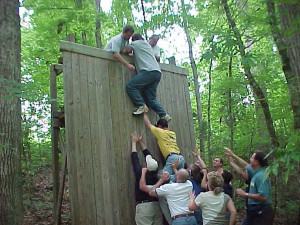
Team building is essential for organizational success. If co-workers can not effectively work together to foster creativity and solve problems, the chances for positive change is slim to none. This is why when considering the next team building event it’s important to choose staff team building activities that will help employees learn how to work together to maximize results and not just build team camaraderie.
However, there are some challenges to overcome. Specifically for the millennial workforce and seasoned employees who have seen it all! This is why it is important to understand the makeup of the group first.
4 Generations of Workers
The American workforce is comprised of four generations of workers. Each generation has their strengths. However, the challenge is getting the various generations to work well together. In order to do that, it is essential to understand how each generation approaches a task, the preferred method of communication and how each generation views an organization as a whole.
Millennials
Born 1981-200, this generation of workers comprises the second largest segment of the workforce (about 75 million). Characteristics of the millennial worker include:
- Looking for meaningful employment
- Very comfortable with technology (prefer text/email for business communications)
- Work well independently, with flexible hours
- Very social, requires personal connections to co-workers
- Prefer constructive feedback from management
- Strive to understand “why” when assigned a task
Overall millennials are characterized as young adults, new to the workforce. These individuals are beginning their careers under a perceived 24/7 availability. As a result, they are proficient with technology, but do require “meaningful” work as a primary incentive to complete a job/task.
Generation X
Born 1965-1980, this generation of workers is often left out of the equation. They are the smallest segment of the workforce (around 50 million). Some Generation X characteristics (a.k.a. GenXers) are:
- Skeptical, but adaptable
- Possess a passing familiarity with technology
- View a job as a contract and not a calling
- Thrive in a more informal work setting, but require ready access to information and management
GenXers are well into their careers, so they are familiar with bottom lines and the need for an organization to measure results. However, they definitely do not work under a 24/7 availability assumption like Millennials. This generation of workers requires work/life balance and is not “ok” with when work blurs into family time.
Baby Boomers
Born 1946-1964, this generation of workers comprises the bulk (around 80 million) of the workforce. This generation is know as:
- Hardworking, willing to work long hours to complete a task
- Driven to succeed
- Knowledgeable about technology, but prefer face-to-face interaction
- Strive for a democratic management style that is fair, where everyone gets a say
Baby Boomers are more likely to hold a meeting or conference call to ensure collaboration. Technology is utilized, but the need to engage on a more personal level is more desirable to this generation.
Silent Generation
Born 1945 or earlier, this generation comprises a dwindling segment of the workforce. The Silent Generation is more likely to:
- Follows the rules
- Be loyal and dedicated to an organization
- Not question the chain of command
- Be self-sacrificing for the good of the organization
Just like the Baby Boomers, GenXers, and Millennials, members of the Silent Generation have valuable characteristics to share with the “younger” workforce. How to get all to work together is the crux of team building.
Go Beyond Social Interaction
Be careful when planning your corporate group activities. Whatever the makeup of the group, be assured that the main point to team building is learning how to solve or create and not just enhance team camaraderie. What is important to one generation, isn’t always as important to all generations of workers.
For example, social interaction in the form of cooking classes, cruises or go-carts may go over well for the Millennial worker. This is because the need to engage on a more social level with co-workers is an important Millennial characteristic since they grew up with access to personal information on an unprecedented level (i.e MySpace, Facebook, Instagram). However, the GenXer’s best use of time is not engaging in what they may view as extended “work time”. At minimum, the exercise should include real problem solving and not just social interaction.
Build, Not Just Compete
Be wary of fun activities that only provide competition against one another. There really isn’t any team building happening if co-worker is set against co-worker. In fact, these types of activities (i.e. ping pong tournaments, bumper cars, golfing and Olympics) can provide the opposite of team building if you aren’t careful. Competition based activities are fine when a company just wants the outcomes, fun or competition.
When an organization really wants to build the team, the following elements must be present:
- Working together to problem solve
- Creating trust between one another
- Using more than one type of communication with one another
- Building a relationship between one another
Some popular team building activities that include these elements are ropes courses and escape rooms. With these types of engaging and fun outings, all workers, no matter which generation will have fun while learning how to work with one another to solve problems.
Team building, be it team building for nurses or team building for teachers, includes much more than just “getting to know one another better”. Although team camaraderie is an important part of an effective creative problem solving organization, it must be combined with more meaningful interaction to be true team building.
Engage in True Team Building with Larry Lipman!
Larry is a Team Building Specialist who success coaches participants into powerful, cohesive TEAMS. He can help engage your team to reach real results and achieve participant buy-in for new ideas and solutions. Call Larry today at 770-333-3303 and find out for yourself how powerful team building can be for your organization!






